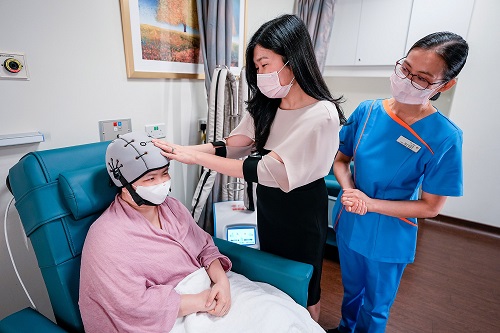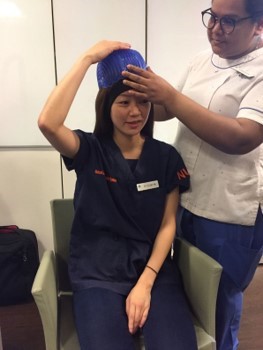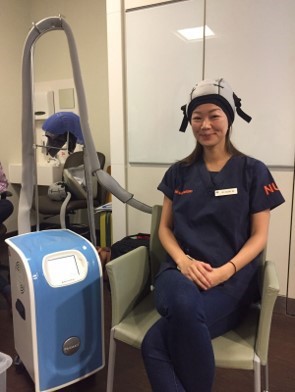
29 January 2022 - Study shows over 50 per cent of patients reported hair preservation and those who had hair loss experienced improved rate of hair regrowth
Losing hair from chemotherapy can be very distressing for many patients with cancer and can contribute to a patient’s stress and anxiety. The National University Cancer Institute, Singapore (NCIS) at the National University Hospital (NUH) now offers scalp cooling therapy to patients undergoing certain types of chemotherapy that may cause hair loss.
Chemotherapy-induced alopecia or hair loss is a common side effect that affects more than 75 per cent of patients who are prescribed chemotherapy treatment. It is caused by cytotoxic agents such as topoisomerase inhibitors, alkylating agents and anti-microtubule agents that are commonly used in the treatment of various cancers including breast, lung, gastrointestinal and gynaecological cancers. Chemotherapy works by targeting rapidly dividing and growing cells and thus aims to remove, kill and damage cancer cells. Unfortunately, hair cells are the second fastest dividing cells in the body, and hair follicles in the growth phase are affected by the same chemotherapy drugs, resulting in hair loss starting approximately two weeks after commencement of chemotherapy treatment.
Between December 2017 and May 2019, NCIS clinicians and nurses collaborated with scalp cooling specialist, Paxman Coolers Ltd (UK), to study the tolerability of scalp cooling therapy in Asian patients and whether the therapy can reduce their chemotherapy-induced alopecia. The pilot study recruited over 80 patients with breast and gynaecological cancers undergoing chemotherapy at NCIS and more than 500 scalp cooling cycles were performed. More than 50 per cent of the patients reported hair preservation or had hair loss but experienced good hair regrowth, even during the course of chemotherapy treatment when undergoing a different chemotherapy1. The NCIS study also found that 90 per cent of patients found scalp cooling comfortable.
Dr Joline Lim, Consultant, Department of Haematology-Oncology, NCIS, who led the study explained, "Receiving a cancer diagnosis is a life-changing event, with many adaptations required for both patient and their loved ones. To have to undergo physical changes due to chemotherapy on top of changes they are already experiencing from the cancer may make the journey even more challenging. Some patients may find the experience of losing hair after chemotherapy traumatic or disturbing, view alopecia as a constant reminder of their disease and may develop a negative attitude towards treatment. Additionally, some patients are highly private by nature and may wish to keep their diagnosis to themselves. Having hair loss may lead to unwanted attention or questions from the people around them. We want to alleviate this possible stress among our patients and are glad to introduce scalp cooling therapy as a clinical service to benefit more patients. As we walk with our patients through their cancer journey, we hope they feel supported not just in terms of the disease treatment, but also their physical and emotional well-being which is vital for recovery."
Dr Lee Yee Mei, Head and Advanced Practice Nurse, Division of Nursing Oncology, NCIS, said, "Scalp cooling therapy is a collaborative effort of doctors and nurses. By making a difference in chemotherapy-induced hair loss, we hope it can help boost our patients' morale and make them feel better while on cancer treatment."
A partnership to benefit Asian patients
Scalp cooling therapy has been shown to reduce chemotherapy-induced alopecia in the Caucasian population but there were few published data on its efficacy on the Asian population prior to this. The NCIS study is the first to work with Paxman to investigate the role of scalp cooling in a multi-racial Asian setting. Paxman is dedicated to improving the efficacy of scalp cooling therapy, and has recently introduced caps that are customised for the Asian head shape. These caps are now available at NCIS.
Mr Richard Paxman, CEO of Paxman commented, "We are delighted that our scalp cooling system is now an option for cancer patients receiving chemotherapy treatment at NCIS following the successful pilot trial for this critical group of patients in Asia. Their mission to keep the patient at the heart of all NCIS programmes is so well-aligned with Paxman's own goals for access to scalp cooling. We will continue to strive to ensure that every applicable patient, no matter their age or where in the world, has the opportunity to maintain a sense of normality by keeping their hair through chemotherapy treatment."
Scalp cooling therapy is available to NCIS patients who undergo chemotherapy at NUH, where nurses have been trained to administer the therapy at the chemotherapy suites. More than
200 patients have benefited from the service to date since the therapy was trialled in December 2017.
Those who are interested in the service can consult their primary doctor on suitability. There are plans to also make the service available to patients at Ng Teng Fong General Hospital, where cancer care services are being offered, by the second quarter of 2022.
How Scalp Cooling Works
Scalp cooling works by reducing the temperature of the scalp immediately before, during and after the administration of chemotherapy. The scalp cooling system delivers the cooling via a "cold cap" that is worn on the head of the patient. Reducing the scalp temperature decreases the blood flow rate to the scalp by 60-80 percent, alleviating the damage caused to the hair follicles by chemotherapy.
A scalp cooling therapy begins with the measurement and adjustment of the "cold cap" on the patient's scalp. This is to ensure the scalp remains at an even, constant cool temperature throughout the therapy to minimise hair loss. A session consists of 30 minutes of cooling immediately before chemotherapy begins, throughout the entire chemotherapy infusion and up to 90 minutes after the completion of the infusion.
A nurse demonstrating how the measurement for a "cold cap" is taken and adjusted on a patient's head before the start of a scalp cooling therapy session. (Photo taken before COVID- 19).
The "cold cap" worn on the patient's head ensures that the scalp remains at an even, constant cool temperature throughout the therapy to alleviate the damage caused to the hair follicles by chemotherapy and minimise hair loss.
Related:




















